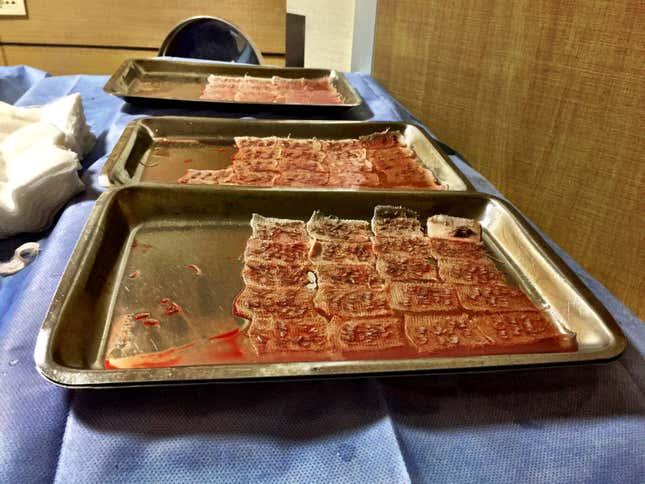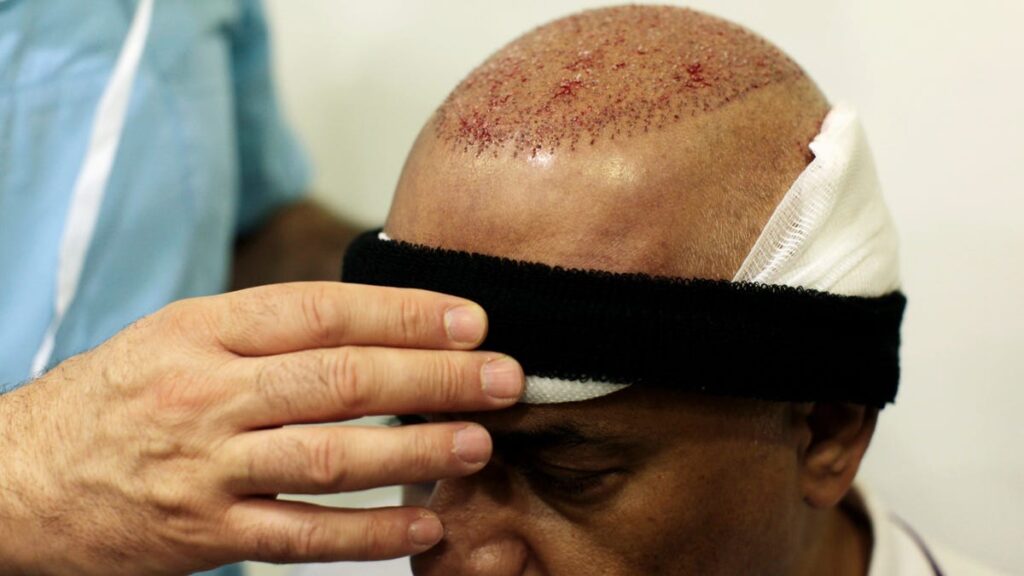Walking through Taksim Square, the heart of modern-day Istanbul, you will see groups of men wandering around with bandages on their heads or with bright red marks on the tops of their heads shaped like boomerangs stretching from temple to temple.
They are a testament to one of Turkey’s fastest-growing industries. Despite a major decline in tourism overall in recent years, Turkey has become a destination for medical tourists seeking hair transplants. Emin Çakmak, chairman of Turkey’s Medical Tourism Development Council, told Turkish newspaper Hürriyet that some 750,000 medical tourists visited Turkey last year, and about 60,000 arrive each year for hair transplants. Huesin Kaşık, chairman of the Middle East Tourist and Travel Agents Association, estimates that between 150 and 500 hair transplants are performed every week.
Hair transplants are rigorous, expensive procedures in which a doctor or technician makes thousands of tiny incisions in the front of your scalp, then harvests hair follicles from the back of your head and inserts them into the incisions at the front. If successful, new hair grows and is one of the few ways to combat alopecia. If the procedure is unsuccessful, hair may grow in an unnatural direction, increasing the risk of skin infections and scarring.
Aziz Kelout, 28, from Algeria, came to Istanbul in 2017 after his hair started falling out about three years ago. On February 23, he sat anxiously in the lobby of a hair clinic, his head bandaged. He was looking forward to getting his hair back. “Usually I’m very confident about myself, but after my hair started falling out, I lost more and more confidence. I just want my hair back,” he said. Kelout found the clinic on Facebook and was inspired by the before and after photos his friends had posted. So he flew to Istanbul.

Aziz Kherout from Algeria after a hair transplant at Clinic Expert in Istanbul. Photo: Pesha Magid
Hair transplant surgery in Turkey is not just a medical procedure. Almost all clinics in Istanbul offer package deals. A private driver arranged by the clinic will pick you up from the airport to your hotel. Your hotel room will already be booked by the clinic, so you don’t have to worry about transportation on the day of the surgery. That will also be arranged by the clinic.
While a hair transplant in the United States or Europe can cost up to $25,000, in Istanbul it costs just $600 to $2,000, so people come in droves.
One reason is fierce competition among clinics in the city. There are now a plethora of clinics, “sprung up like rabbits,” says Talip Tastemel, general manager of Clinic Expert, one of Turkey’s largest hair transplant clinics. And many are willing to go to extreme measures to lower costs to attract customers looking for cheaper terms. Tastemel says the increased competition is pushing clinics to hire unqualified people to perform the procedures to cut costs.
Despite a legal requirement in Turkey that all hair transplant procedures be performed by a doctor, Taystomer acknowledges that even at Clinic Expert, doctors do not perform the majority of procedures: “After years of work, nurses and technicians need minimal supervision. But it is common for doctors to step in for complicated cases or complications,” he says.
Most clinics ignore this rule altogether, as the race for customers has outweighed concerns about quality over the past five to six years. Tayfun Oguzoglu, a doctor who runs the upscale Advanced Hair Clinic, says it’s common for patients to consult with a doctor before surgery and be led to believe the doctor will perform the procedure, when in fact it will be a nurse or technician.
A nurse performing a hair transplant at the Clinic Expert Hair Transplant Clinic in Istanbul. Photo: Peha Magid
Oguzoglu said the clinics go unpunished because Health Ministry inspectors are willing to accept bribes in exchange for warning them that a formal inspection is on the way. “Someone pays a lot of money,” he said, and once the inspection is done, the clinics make it look like they’re operating completely fairly. The Health Ministry did not respond to Quartz’s request for comment.
Affordable hair transplants remain one of the few attractions for tourists visiting Turkey, whose tourism industry fell sharply in 2016 after several terrorist attacks and a failed military coup, and has never recovered except in one area: hair transplant tourism.
Clinic owners say that’s because a large portion of their clients are from Middle Eastern countries. Bugra Ersin Murtezaoglu, general manager of Natural Hair Turkey, estimates that 90 percent of his clients are from the Middle East, who he says are less likely to be frightened by political upheaval in Turkey than those from Europe or North America. In fact, Oguzoglu, who markets mostly to Europe and the U.S., says he was deeply affected by both the attempted coup in July and the attack on the popular Reina nightclub on New Year’s Day, which left 39 people dead.
This unusual situation has also had a side effect: a mini-economy has emerged within the hair-transplant industry for Arabic-speaking Syrian refugees.
Ahmed, a Syrian refugee who asked not to be identified for fear of retribution, has been working in the industry for a year, recruiting clients and then guiding them through the process. He’s the one who gets late-night calls from clients asking about the work, and he also acts as a translator between arriving clients and Turkish staff. He says Syrian workers are often exploited by employers who consider them disposable. “They make us work 10 hours a day and give us only one day off. [per week]”You still get calls and you have to work, so it’s not a day off. If you don’t answer the phone you get penalized. Your pay might be cut, your holidays might be cut,” he says.
Mahmoud, a Syrian refugee and veteran of Istanbul’s hair-transplant industry who asked not to be named, said he has worked for three different companies to build up clients and that fierce competition between clinics means employers are constantly looking for ways to cut costs, often at the expense of employees.
For example, clinics often offer a poverty-level base salary plus commission, but set unreasonable sales quotas that mean no commission is paid at all. “At one company, if you don’t make your quota, it carries over to the next month,” Mahmoud says. “I had a guy with a quota of $120,000. He can’t quit because he has a family, so he’s working for a base salary of 1,500 Turkish lira (about $400).”

Removed hair follicles waiting for transplant at Clinic Expert in Istanbul. Photo: Pesha Magid
Mahmoud said the situation is especially tough for Syrian refugees, many of whom do not have proper work permits and therefore have no legal recourse if they are mistreated by their employers. He said it is difficult for Syrians to find work in Turkey, so many are afraid to quit their jobs despite the long hours and low pay.
Nicholas Griswood, an expert on crisis migration at the International Labour Organization (ILO), said many of the problems Syrian refugees have reported in the hair transplant industry are common to Syrian refugees across Turkey. “Refugees are willing to accept conditions that Turks are not willing to accept. They put themselves at risk just to survive,” he explained. While the ILO has not specifically investigated the hair transplant industry, Griswood said it has observed that many refugees work long hours for low wages and do not have work permits.
Emre Eren Korkmaz, a researcher at the International Migration Institute, agrees: “As a result of bureaucratic procedures and conditions for obtaining work permits, Syrian refugees are typically employed in the informal economy, are not registered with social security systems, and do not have access to fundamental rights and freedoms such as freedom of association, health and safety, working hours, or minimum wages,” Korkmaz said.
Murtezaoglu and Tastemel strongly deny that their Syrian employees are being mistreated in any way. “Generally in medical settings you have to be on call day and night, it’s a normal requirement in this field. This doesn’t mean they’re being mistreated because they’re Syrian,” Tastemel says. “To be honest, a lot of refugees and Syrians are earning a decent living and salary thanks to this market. Usually there aren’t many opportunities for refugees.”
A previous version of this article stated that 1,500 Turkish liras is equivalent to about $0.25. In reality, it’s equivalent to about $400.


